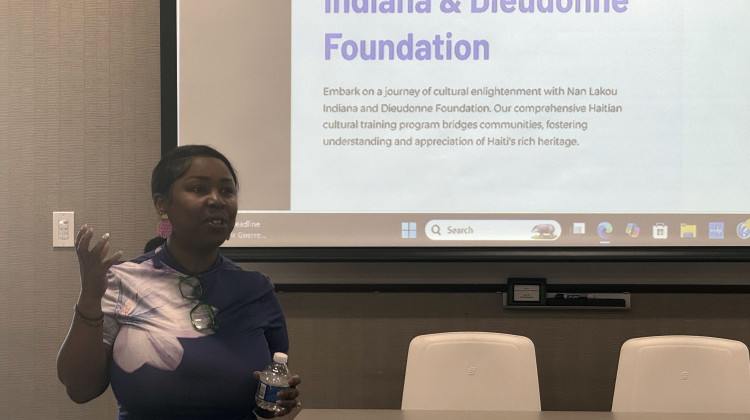
Democratic candidates for House District 95: John Bartlett and Autumn Carter.
Jennifer Wilson for Mirror Indy (left); Doug McSchooler for Mirror Indy (right)By Emily Hopkins
For only the second time in at least 16 years, voters on the far east side will have a choice over who will appear as the Democratic candidate on November’s general election ballot.
The incumbent Rep. John Bartlett, a 75-year-old retired tool-and-die maker for Rolls-Royce, will face off against Autumn Carter, a 34-year-old author and public speaker who also works in information technology at Health & Hospital Corporation of Marion County.
Whoever wins the May 7 primary election will have a good chance of representing more than 68,000 residents in the House District 95, which includes parts of Lawrence, Geist and the far east side. Although Republicans have until July 3 to fill any ballot vacancies, the GOP has not run a candidate in the district since 2010.
Political beginnings
Both candidates found their way to pursuing public office after gaining experience with the Democratic party.
Bartlett started out as a precinct committeeman and later served as a member of the Mayor’s Neighborhood Advisory Council. But his journey to elected office really began during the 16 years he served as campaign manager for the late former Rep. Mae Dickinson.

“She was kind of like a second mother to me,” Bartlett said. Dickinson, who represented House District 95 for 15 years, had told Bartlett in passing that she wanted him one day to take her place. In 2007, the call came.
“She said, ‘It’s time you need to take this over,’ and my heart rate just went shoo, shoo, shoo,” Bartlett said. “And I said, OK.’” He’s held the seat ever since.
Carter has also worked for the party as a state delegate as well as the state finance director for the Marion County Democratic Party. But it was as a legislative assistant for the Ice Miller law firm where she first got a taste for lawmaking.
In that role, she watched how some bills became law and others were left to die — and who was responsible.
“As everyday citizens, you don’t know where the laws come from, you just know you can’t do A, B, C and D,” Carter said. “So that process intrigued me.”
Personal experiences and challenges have also inspired her to pursue leadership roles, Carter said. She wants to see more people like her leading at the Statehouse — just over 26% of Indiana’s state lawmakers are women, and most of those women are white.
She also became a single mother at the age of 23. When she was 30, she was diagnosed with Stage 4 breast cancer.
Her doctor initially dismissed her concerns, saying she was too young for a mammogram. When she looks back at her experience, she also thinks race was a factor. Her intuition and some encouragement by a friend led her to seek a second opinion.
“I felt I was unprotected,” Carter said. She sees herself as someone who can protect her district. “I’m the person who’s gonna be that bulldog for this community.”
Different legislative approaches
There’s another reason Carter said she decided to run for the seat.
“I feel like it’s not being utilized at its full capacity. I respect my opponent, and I respect the work that he’s done in his 16-year tenure,” Carter said. “But I do think that we could do more.”

For at least the last 11 legislative sessions, Bartlett has authored just one bill that has been signed into law — a 2017 measure that aimed to protect religious expression in schools.
Bartlett said the statistic belies his legislative impact.
“You’ve got to be innovative when you got 30 to 70,” Bartlett said, referring to the current ratio of Democrats to Republicans in the House. “The majority rules in that situation.”
Bartlett pointed to his work championing veterans’ issues. In addition to resolutions he’s authored to honor veterans’ service, he founded an annual veterans and military legislative day at the Statehouse. The event has resulted in dozens of bills being passed on issues important to those communities, he said.
Bartlett also said he’s willing to become a co-author or sponsor of legislation if that means it has a better chance of passing. He cited 2021 legislation to form a crime guns task force in Central Indiana to help law enforcement get illegal firearms off the street.
“It’s not so much as who gets the credit. Hoosiers need it,” Bartlett said.
That said, Bartlett views his work as a legislator as falling largely outside of his work at the General Assembly.
“Probably a tenth of my job is at the Statehouse,” he said. He likes to hold what he calls kitchen table conversations, where he will meet with constituents in groups of seven or eight, bring packets of resources and listen. “I don’t hide from my constituency, I want to hear from you. If I’m not doing something I want to know,” he said.
That’s one area where the two candidates agree. Carter also wants to carry ideas that come from her constituents. Ahead of her campaign, she said she held community listening sessions to craft her priorities.
“This is the people’s seat. My job is to hear them out,” Carter said.
Legislative interests
As a potential lawmaker, Carter has several areas of interest: public safety, health care, education, affordable housing. But broadly speaking, she said she wants to push for policies that allow people in her district to thrive.
“I feel like it’s a trend that people take our resources and they run off, and they don’t really replenish,” Carter said.
If she’s elected, she said she would file as much legislation as she can and make relationships with Republicans to advance her district’s priorities.
She’d like to craft legislation around alternative funding streams for youth activities and creating state funding for local startups. She also wants to make it easier for residents experiencing financial hardship to find services, and explore shorter sentences for nonviolent petty crimes while saving taxpayer dollars in the process.
She wants to help teachers who are struggling to cover their cost of living. And while it may be unrealistic to repeal the state’s permitless carry law in a legislature controlled by Republicans, she’d like to find compromises that keep firearms out of the wrong hands.
“I want to be able to write as many bills as possible, and kind of narrow it down from there — shoot amongst the stars,” she said.
In recent years, Bartlett has become particularly interested in preventing human trafficking, authoring and supporting several bills and resolutions on the topic.
For several years he has carried a resolution to recognize January as human trafficking awareness month. He’s also authored bills that would have required trafficking prevention training for school employees and urged a study committee on the topic.
“I think that’s the worst crime that can be committed,” Bartlett said.
Last year he co-authored a bill to require motorists applying for a commercial driver’s license to attest that they had seen an instructional video on human trafficking. The year before he sponsored a Senate bill to make it easier to charge someone with human trafficking. Both became law.
How to vote in the Indiana primary
Marion County residents with a valid government-issued photo ID can vote early at the City-County Building from April 9 through May 6, and at one of nine early voting centers from April 27 through May 5. On election day, which is May 7, residents can vote at any one of more than 180 vote centers throughout the county.
Mirror Indy reporter Emily Hopkins uses data to write stories about people. Contact them at 317-790-5268 or emily.hopkins@mirrorindy.org. Follow them on most social media @indyemapolis.
 DONATE
DONATE






 Support WFYI. We can't do it without you.
Support WFYI. We can't do it without you.